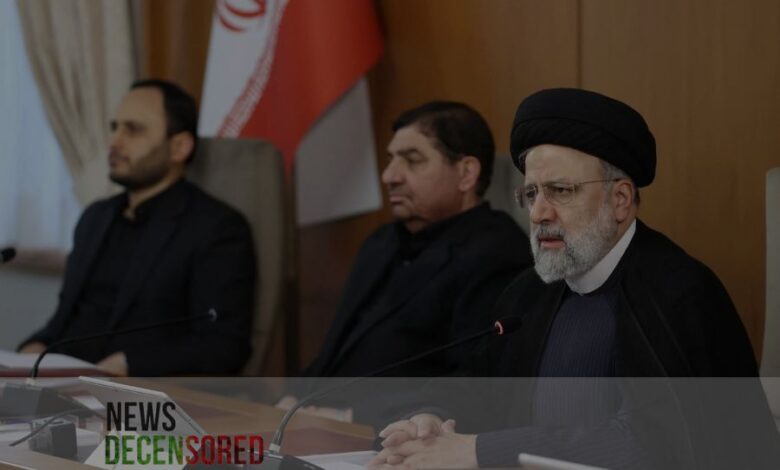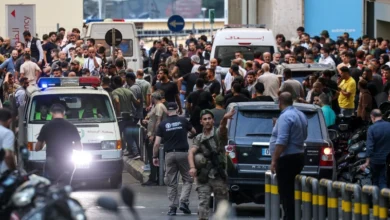Iran has put Israel in a dilemma and strengthened its image as a weak country

Israel is currently experiencing a strategic dilemma due to the Iranian attack that targeted it last Saturday evening, which increased its position in the category of a weak state that can be attacked directly, while Prime Minister Benjamin Netanyahu is trying to exploit this development to evade the prisoner exchange deal and enter the city of Rafah in the southern Gaza Strip, according to Experts.
What further complicated the Israeli government’s position – according to experts – was Netanyahu’s failure to shift internal attention from Gaza to Iran, as the families of the prisoners did not give him the opportunity and were quick to escalate their demands to move forward with a deal that would return their families.
While Israel focuses its talk on what it considers a victory in confronting the Iranian attack and threatening an imminent military response, it is experiencing an unprecedented strategic dilemma because of this response, says Israeli affairs expert Dr. Muhannad Mustafa.
Strengthening Israel’s weak image
Mustafa stressed – during his participation in the program “Gaza… What Next?” – that Israel’s response to the Iranian strike may ignite the region, while its failure to respond will strengthen its image as a weak country against which strikes can be directed.
However, Dr. Hassan Ayoub, professor of political science at An-Najah University, says that Israel “believes that it has regained Western support after Western solidarity to repel the Iranian attack,” stressing that it is “trying to exploit it militarily and diplomatically.”
Ayoub believes that Western countries will continue to prevent any military defeat against Israel “because it represents a Western dagger in the side of Arab countries,” stressing that the West “knows that Iran’s decision to launch this direct strike after the Al-Aqsa Flood operation and Hezbollah’s strikes led to the erosion of Israeli prestige despite attempts to attack Israel.” Aviv appears victorious,” he said.
Ayoub went on to say that the recent change in positions of Western countries towards Israel “is due to popular pressure and the scale of the crimes committed in Gaza, as well as the genocide case brought before the International Court of Justice,” he said.
Internal fires
However, this decline in Israel’s ability to win – the political science professor adds – “will ignite fires within it because everything the Netanyahu government does increases regional hostility towards Tel Aviv and discredits the idea that it is a safe haven for Jews in the world, which is what is currently putting it in a dilemma.”
Mustafa supports Ayoub’s talk about the increasing internal disputes in Israel, because Netanyahu’s old method of exploiting the Iranian threat to push society to rally around his person “did not succeed this time.”
Mustafa attributes the failure of the Iranian attack to create an Israeli rally around Netanyahu to the fact that the prisoners in Gaza “belong to families with great political and economic influence, and therefore, they understand the prime minister’s tricks well.”
From this standpoint, the families of the prisoners went to escalate their demands to conclude an exchange deal and demand the dismissal of Netanyahu, to the point that 65% of Israelis are demanding early elections even after the Iranian attack, despite the Israeli celebration of repelling it, as Mustafa says.
In addition, Mustafa says, criticism of the Prime Minister is increasing, whom a large segment accuses of “turning Israel into a weak country vulnerable to attack from any party,” adding that Netanyahu is “going through another crisis because of the Rafah process, which enjoys the consensus of the security and military institutions, and at the same time there is There is a great controversy regarding the comparison between it and an exchange deal with the Islamic Resistance Movement (Hamas).”
The American rejection of the Rafah operation also puts more pressure on Netanyahu, because there are those who refuse to go beyond Washington’s position and proceed with an operation without its support, in Mustafa’s opinion.
But Ayoub downplays all of these problems on Netanyahu’s political position, and says that “there is no ability to form a parliamentary coalition that can topple the government, in addition to the fact that the opposition is too weak to form a force that will seriously pressure Netanyahu.”
Not only that – Ayoub adds – but War Council member Benny Gantz supports a ground operation in Rafah and a military response to Iran, which means that the internal catharsis after the Tehran attack “seemed to be instantaneous, because the internal dispute is structural and related to Israel’s future in the region,” as he put it.
Based on these data, Ayoub believes that the United States is “trying to exploit the Iranian attack to support Israel again, while the Netanyahu government is trying to escape negotiations and evade any commitment to stop the fighting in Gaza by blaming Hamas.”
Ayoub believes that Netanyahu may accuse Hamas of rejecting all proposals, especially since the movement has shown a degree of extremism and emphasis on its principles, and has even gone far with regard to talking about the treatment of Palestinian prisoners and implementing any agreement in 3 stages.




